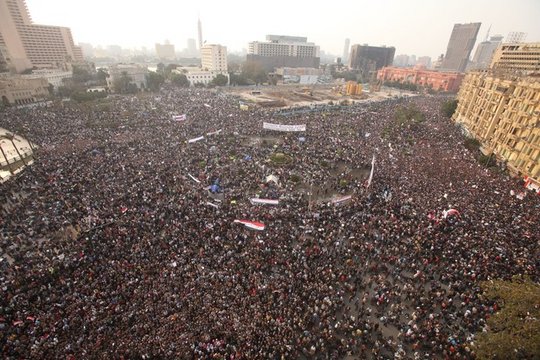Tunisia
"PEN International warmly welcomes the democratic developments in Tunisia," said John Ralston Saul, President of PEN International.  "However, we are alarmed by the trampling on the rights of citizens to transparency, information, knowledge and freedom of assembly elsewhere, most recently in Egypt over the past several days."
"However, we are alarmed by the trampling on the rights of citizens to transparency, information, knowledge and freedom of assembly elsewhere, most recently in Egypt over the past several days."
PEN welcomes in particular the release of all Tunisian journalists, bloggers and other political prisoners, following the protests which ended 23 years of President Ben Ali’s rule. It also welcomes the lifting of many restrictions previously imposed on freedom of expression. PEN hopes for a full recognition of free speech and the right to assembly in Tunisia.
Egypt
Over 90 organizations, including Article19, from all over the world signed an appeal today urged all governments, regional and international organizations, to denounce the ongoing violent crackdown against the public protests and demands for democratic reform and government accountability that have been occurring across Egypt since the 25th of January.
They blame the Egyptian government for responding to protests (below, Cairo) too harsh – using beatings, rubber bullets, detentions, etc.
“Moreover, a state imposed black-out on national cell phone services, the internet and independent media channels was put in place on the 28th of January, making it very difficult for Egyptians to report any abuses occurring. On that same day the Egyptian government began to deploy military forces in supplement of internal security forces.” says an appeal.
Scores have been arrested in the crackdown on peaceful protesters calling for democratic reform, including several journalists. At least ten journalists covering the demonstrations have been attacked, tight restrictions have been imposed on freedom of assembly, and there has been widespread disruption to internet and mobile-phone connections.
ten journalists covering the demonstrations have been attacked, tight restrictions have been imposed on freedom of assembly, and there has been widespread disruption to internet and mobile-phone connections.
Egyptian authorities have also shut down the websites of two popular independent newspapers, Al-Dustour and El-Badil, and a number of social media sites, blocked access to Twitter, Facebook. On 30 January 2011, Egypt shut down the Al Jazeera bureau in Cairo.
According to Index on Censorship, this is a move to deprive the Egyptian public of vital information and the ability to communicate with each other.
Index on Censorship is gravely concerned at the loss of life and injury to protesters of the popular antigovernment protest in Egypt. According to the most recent reports, at least 100 people have died and thousands have been injured since the protests against President Mubarak’s regime.
The appeal from international civil society calls on the United Nations, its Member States and regional bodies to condemn the serious and widespread human rights violations carried out by the Egyptian authorities against civilians throughout the country.
“With the strong risk that repression, violence and instability in Egypt could escalate to unprecedented levels in the coming days, it is critical that individual governments from all regions of the world urgently exert strong and concerted pressure on the Egyptian government to curb human rights abuses.” reads the appeal.
Yemen
In Yemen, tens of thousands of peaceful opposition activists (below) have also taken to the streets demanding democratic and social changes.  On Thursday around 10,000 people took to the capital’s streets. Fortunately there is no tension on the streets.
On Thursday around 10,000 people took to the capital’s streets. Fortunately there is no tension on the streets.
Observers say protests in Yemen are slightly different. According to them, protests in Yemen, despite impressive numbers of people on the streets, were rather political rallies, there have been almost no spontaneous gatherings.
Syria
In Syria, the authorities have blocked Facebook and other social network providers including mobile message facilities (SMS) in an attempt to suppress antigovernment protests. There are fears that opposition activists, writers and journalists in both these countries are at increased risk of arrest.
No violence!
PEN International urges the authorities in Egypt, Tunisia and Yemen to refrain from using violence to respond to peaceful protests, and reminds these governments of their commitments to freedom of expression as guaranteed by Article 19 of the International Covenant on Civil and Political Rights.
"The worldwide community of PEN reiterates our solidarity with our colleagues as they seek democracy and practice their fundamental rights to speak, write and join their fellow citizens in peaceful protest," said Mr. Saul.


